GRBusiness
Companies that suffer data breach could lose up to one third of your customers


Astonishing findings from RSA’s recent survey in the UK showed that 28 percent of customers have elected to boycott companies that have been shown to mishandle personal data.
RSA is a global cybersecurity leader with consulting and technology solutions that empower firms by providing a holistic view of cybersecurity needs in order to reduce risk and rapidly respond to incidents.
“South African businesses should be prepared for similar consumer trends in the near future,” believes Anton Jacobsz, managing director at value-added distributor, Networks Unlimited Africa, which delivers the full range of RSA solutions to the local market.
“Consumers are becoming increasingly aware and sensitive about how their service providers use their personal data, and for those organisations that suffer high-profile data breaches, there is a very real possibility that customers will ‘vote with their feet’.”
The RSA survey goes on to reveal that the majority of consumers (57 percent) have no idea how many times their personal data may have been placed at risk, given the flood of headline-grabbing cyber-security breaches over recent months.
GDPR and PoPI
While analysts estimate that only about a tenth of all breaches are reported to the public, this is about to change, as the European Union’s General Data Protection Regulations (GDPR) finally kicked in on 25 May.
“For businesses operating in the EU, or even for local businesses that provide services to EU citizens, the new laws will ensure that any and all data breaches are disclosed within a 72-hour period,” explains Jacobsz.
GDPR is enshrined in European Union law, giving it automatic credence among all member states. It seeks to harmonise data protection regulations throughout the region, placing stringent rules on how organisations gather and use individuals’ personal data, increasing levels of transparency, giving individuals greater control over how their data is used, and ensuring mandatory disclosure of any breaches.
Under GDPR, companies could face fines of up to 20 million euros, or four percent of annual turnover, which shows the gravity of the issue for large businesses in particular. In South Africa, the pending arrival of our own incoming legislation, the Protection of Personal Information Act (POPIA), expresses a very similar intent to GDPR. Many legal experts believe that achieving compliance with GDPR should essentially imply compliance with PoPIA, once it is enacted.
Staying on the right side of the law
So just how can organisations set about ensuring compliance with both PoPI and GDPR?
“As a global company, RSA has completed a considerable effort to ensure that it prepares organisations for GDPR – identifying gaps, improving readiness, evaluating risk, meeting compliance and rapidly respond to incidents,” says Jacobsz.
“To cater for such broad-reaching compliance requirements, organisations must address cyber-security and data protection at an overall enterprise level,” he adds.
“RSA’s approach incorporates both advisory and technology services, addressing the entire lifecycle of solution fulfilment – from strategy and design, to deployment and operations management.”
While organisations must comply with new legislation, they also cannot halt progress on key digital programmes and transformation projects. To ensure that their digitisation journeys can proceed safely, RSA takes a business-focused approach to one’s cyber-security strategy, ensuring it is aligned with the company’s strategic objectives.
Seven practices to ensure comprehensive defences
In a recent white paper, RSA details the seven key practice areas that it has established to provide comprehensive threat mitigation and ensure regulatory compliance:
Risk management… Tailoring global best-practices to the unique elements required for the foundation of a firm’s holistic risk management programme, including various assessments and stakeholder mapping exercises.
Identity assurance… With identity management at the core of all security programmes (and representing the biggest threat vector), it’s critical to design iron-clad identity management policies and technologies.
Advanced cyber-defence practice… Identifying gaps, prioritising risks and designing programmes to improve defences, integrate solutions, provide deep visibility, detect advanced threats and reduce mitigation time.
Incident response practice… By combining early detection and rapid response, organisations can close the gap between an initial breach and an attacker being able to carry out their objectives.
Professional services… The technology deployment expertise to ensure that organisations gain maximum value from their investments in RSA technology sets.
Research… With a heavy emphasis on R&D, the security solutions from RSA continually adapt to the ever-changing threat landscape and keep pace with new legislation (such as GDPR), while training services help customers to enhance overall awareness and optimise their cybersecurity capabilities.
Enterprise-wide security programme management… to pull it all together, teams of cybersecurity experts analyse an organisation’s overall threat posture, continually making recommendations to further strengthen one’s security practice.
“The risks of data breaches – for both local and international companies – are enormous,” summarises Jacobsz, “ruining an organisation’s reputation, destroying customer trust, and exposing them to heavy regulatory penalties.”
Finance
Banks To Now Charge 0.5% Cybersecurity Levy As Directed By CBN; Netizens React
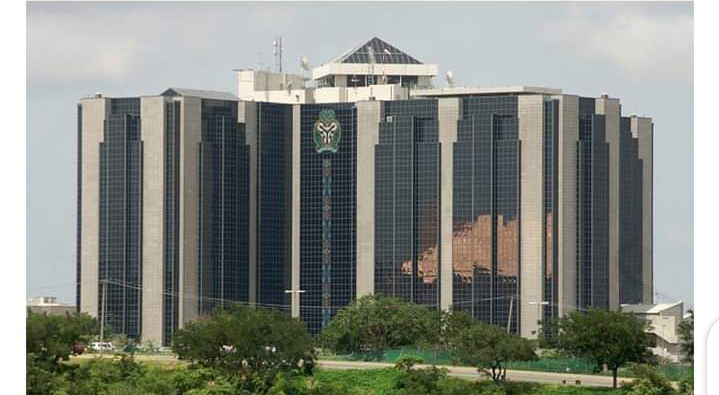

The Central Bank of Nigeria (CBN) has directed deposit money banks in the country to start charging 0.5% cybersecurity levy on some transactions done by their customers.
The apex bank gave the directive in a circular dated May 6, 2024 and sent to all commercial, merchant, non-interest and payment service banks as well as mobile money operators and payment service providers.
“Following the enactment of the Cybercrime (Prohibition, Prevention, etc) (amendment) Act 2024 and pursuant to the provision of Section 44 (2) (a) of the Act, ‘a levy of 0.5% (0.005) equivalent to a half percent of all electronic transactions value by the business specified in the Second Schedule of the Act’, is to be remitted to the National Cybersecurity Fund (NCF), which shall be administered by the Office of the National Security Adviser (ONSA),” the circular partly read.
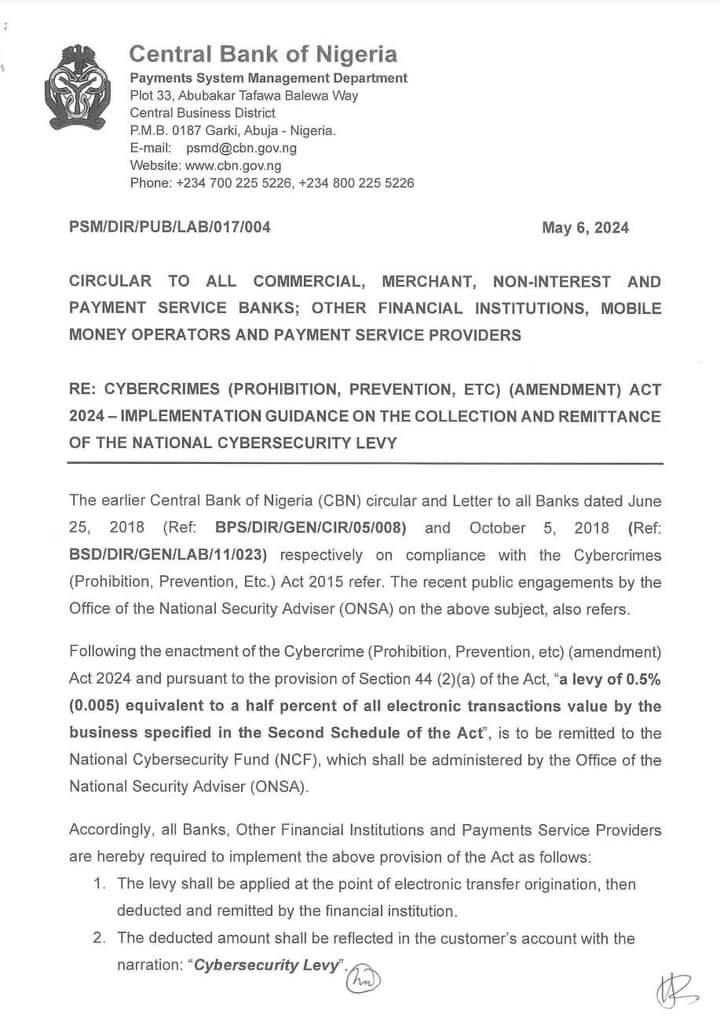

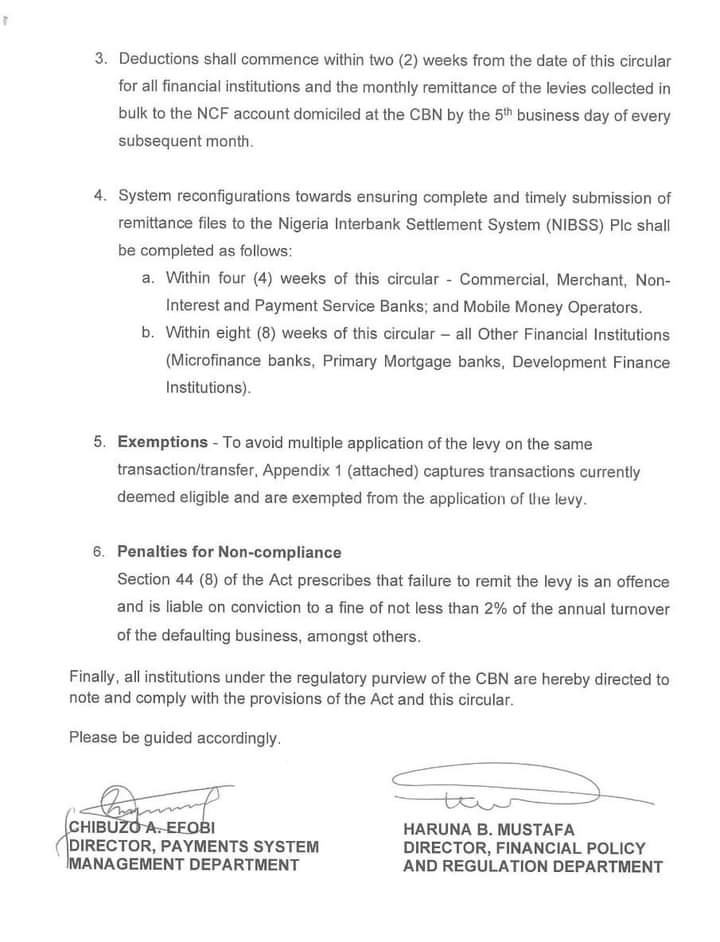

The apex bank said that the implementation of the levy would start two weeks from the date of the circular.
“The levy shall be applied at the point of electronic transfer origination, then deducted and remitted by the financial institution. The deducted amount shall be reflected in the customer’s account with the narration, ‘Cybersecurity Levy’. Deductions shall commence within two weeks from the date of this circular for all financial institutions and the monthly remittance of the levies collected in bulk to the NCF account domiciled at the CBN by the fifth business day of every subsequent month,” the circular said
The apex bank added that this new levy will not be applied on transactions such as loan disbursements and repayments, salary payments, intra-account transfers within the same bank or between different banks for the same customer, intra-bank transfers between customers of the same bank.
Also exempted from the levy were inter-branch transfers within a bank, cheque clearing and settlements, Letters of Credits, Banks’ recapitalisation-related funding only bulk funds movement from collection accounts, savings and deposits including transactions involving long-term investments, among others.
This current implementation however is not sitting well with some netizens as they reacted to the new development.
Here were some of their reactions from X.
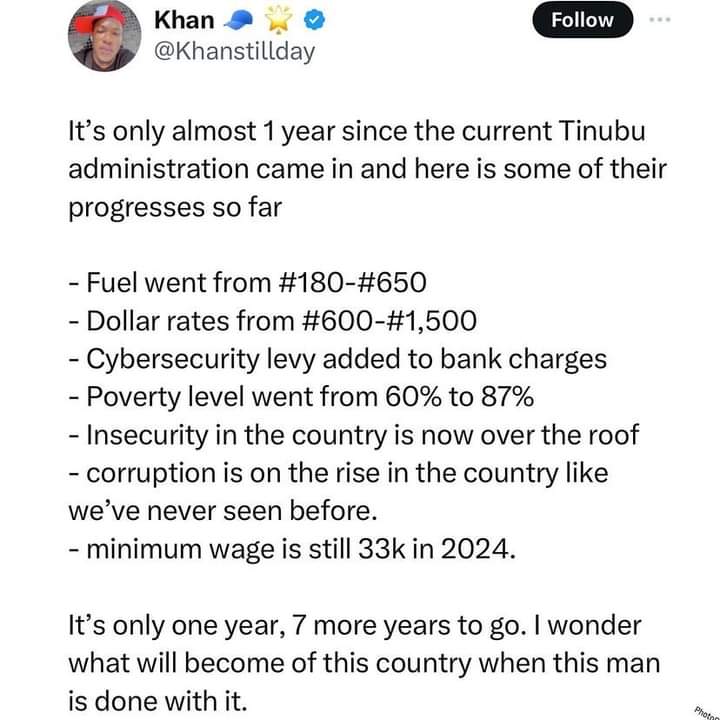





Finance
EFCC Chairman Tasks Nigerian Youths Against Crimes And Fraudulent Acts


The Chairman of Economic Finance Crime Commission (EFCC), Ola Olukoyede, has stressed the need for Nigerian Youth to see themselves as agents of positive change that have a lot to contribute to the socioeconomic development of the Nation.
Speaking at the 2nd edition of a Leadership Trainings Programme in Abuja, Olukoyede, who was represented by the Head Enlightenment and Re-orientation unit, (EFCC), Aisha Mohammed, said the commission’s dream is to see the youth contribute meaningfully to the society, emphasizing on the need to work together in bringing positive change to society.
The Economic and Financial Crimes Commission Boss declared the readiness of his agency to work with all Stakeholders, including the youth towards changing the narrative and reposition the country to greater exploit.
Also speaking, the representative of the Executive Secretary of Tertiary Education Trust Fund (TETFUND), Sonny Echono, appealed to the youths is to eschew social vices that could deter their full potential in life.
Other speakers at the event, including the Chairperson, Zero Tolerance for Social Immoralities Initiative (ZEITI) Africa, Rasak Jeje called on all stakeholders to join hands in collective pursuit of empowering new generation of leaders to curb the rising tides of social Vice among Nigerian youths.
The Chairperson, Zero Tolerance for Social Immoralities Initiative (ZEITI) Africa, Rasak Jeje made the call while addressing journalists at the 2nd edition of it Leadership Trainings Programme in Abuja on Thursday.
He said the training was aimed to intimate students leaders with knowledge and insights that will help them drive positive change and become exemplary leaders in their respective spheres.
Finance
AISA Has Refunded The Fees Paid By Yahaya Bello To EFCC


The Economic and Financial Crimes Commission (EFCC) says the American International School Abuja (AISA) has refunded the fees paid by the immediate past governor of Kogi state, Yahaya Bello, for his children attending the school.
In response to a letter addressed to the Lagos zonal commander of the EFCC, the school said $845,852 was paid in tuition “since the 7th of September 2021 to date”.
AISA said the sum to be refunded is $760,910 because it had deducted educational services already rendered.
“Please forward to us an official written request, with the authentic banking details of the EFCC, for the refund of the above-mentioned funds as previously indicated as part of your investigation into the alleged money laundering activities by the Bello family.
Since the 7th September 2021 to date, $845,852.84 (Eight Hundred and Forty-Five Thousand, Eight Hundred and Fifty Two US Dollars and eighty four cents) in tuition and other fees has been deposited into our Bank account.
We have calculated the net amount to be transferred and refunded to the State, after deducting the educational services rendered as $760,910.84. (Seven Hundred and Sixty Thousand, Nine Hundred and Ten US Dollars and Eighty Four cents).
No further additional fees are expected in respect of tuition as the students’ fees have now been settled until they graduate from ASIA.”
In a chat with The Cable, the spokesperson of the EFCC, Dele Oyewale, confirmed that the school has refunded the money.
‘’The money has been paid into public account,” Dele Oyewale was quoted as saying
-



 Politics2 days ago
Politics2 days agoLagos Water Corporation Starts Protest Against Sack Of Workers
-



 News4 days ago
News4 days ago“80% Of Buildings In Lekki Have No Approval” – Lagos State Commissioner For Physical Planning & Urban Development Reveals
-



 Entertainment4 days ago
Entertainment4 days agoCelebrities Turn Up For The Dedication Of Ali Baba’s Triplets In Lagos
-

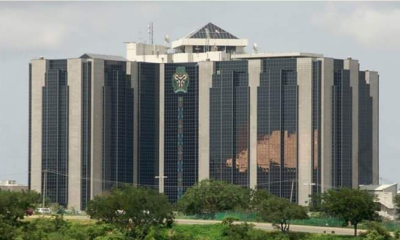

 Finance3 days ago
Finance3 days agoBanks To Now Charge 0.5% Cybersecurity Levy As Directed By CBN; Netizens React
-



 TechNews4 days ago
TechNews4 days agoSIM Boxing, And The Unboxing of a Crime Syndicate
-



 GRTech3 days ago
GRTech3 days agoSHELT SI Achieves Cisco Select Partner Certification
-



 News2 days ago
News2 days agoEkiti Students Caught On Camera Bullying A Fellow Student, Have Been Expelled
-



 Politics23 hours ago
Politics23 hours agoSenate Amends NDLEA Act, Approves Death Penalty For Dangerous Drugs Manufacturers And 15 Years Imprisonment For Users








